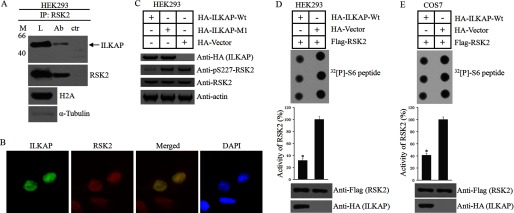FIGURE 8.
ILKAP interacts with RSK2 in the nucleus and inhibits RSK2 kinase activity. A, HEK293 cells were treated with mitogen (M) for 8 h. The nuclear fractions were isolated and lysed (L). RSK2 was precipitated with anti-RSK2 antibody (Ab) and protein G-Sepharose beads. The precipitates were immunoblotted for RSK2 and ILKAP antibody. ctr, control. B, A549 cells were transiently transfected with EGFP-ILKAP for 16 h and treated with mitogen for 8 h. The cells were then stained with anti-RSK2 (red) antibody. DAPI (blue) staining of the nuclei is shown. C, HEK293 cells were transfected with an empty vector or a plasmid expressing either HA-ILKAP or HA-ILKAP Mutant 1 for 16 h. The cells were then treated with mitogen for 8 h, lysed, subjected to SDS-PAGE, and immunoblotted using phosphospecific antibodies to RSK2 phosphorylated at Ser-227, non-phosphospecific antibodies to RSK2 or anti-HA antibody. D and E, HEK293 (D) and COS-7 (E) cells were co-transfected with plasmids expressing HA-ILKAP and FLAG-RSK2. Twenty-four hours after transfection, the cells were serum-starved for 4 h, exposed to 1 ng/ml EGF for 30 min, and lysed. RSK2 was precipitated from the cell lysates with antibody to the FLAG tag, and its kinase activity was determined and expressed as a percentage of the maximal value obtained. * indicates a significant difference (p < 0.05) when compared with the control. Error bars indicate S.D.

